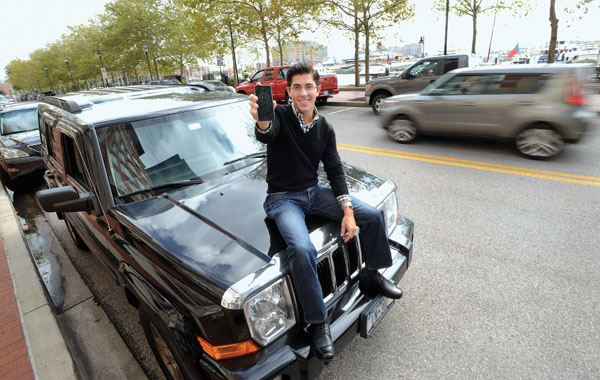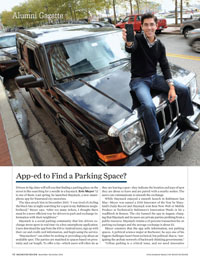Alumni Gazette
 PARK TECH: Meyer wants to harness smartphones to alleviate the headaches of big city parking. (Photo: Steve Ruark/AP Images for Rochester Review)
PARK TECH: Meyer wants to harness smartphones to alleviate the headaches of big city parking. (Photo: Steve Ruark/AP Images for Rochester Review)Drivers in big cities will tell you that finding a parking place on the street is like searching for a needle in a haystack. Eric Meyer ’12 is one of them. Last spring, he launched Haystack, a new smartphone app for frustrated city motorists.
The idea struck him in December 2013. “I was tired of circling the block late at night searching for a spot in my Baltimore neighborhood,” Meyer says. “After too many tickets, I thought there must be a more efficient way for drivers to park and exchange information with their neighbors.”
Haystack is a social parking community that lets drivers exchange street spots in real time via a free smartphone application. Users download the app from the iOS or Android store, sign up with their car and credit card information, and begin using the service.
“Haystackers” can either be seeking or providing a tip about an available spot. The parties are matched to spaces based on proximity and car length. To offer a tip—which users will often do as they are leaving a spot—they indicate the location and type of spot they are about to leave and are paired with a nearby seeker. The users can communicate to smooth the exchange.
While Haystack enjoyed a smooth launch in Baltimore last May—Meyer was named a 2014 Innovator of the Year by Maryland’s Daily Record and Haystack won Best New Web or Mobile Product at Technical.ly Baltimore’s Innovation Week—it hit a roadblock in Boston. The city banned the app in August, charging that Haystack and its users are private parties profiting from a public resource. Haystack retains a 25 percent transaction fee on parking exchanges and the average exchange is about $3.
Meyer counters that the app sells information, not parking spaces. A political science major at Rochester, he says one of his biggest challenges hasn’t been technical, but political: that is, “navigating the archaic network of backward-thinking governments.”
“Urban parking is a critical issue, and we need innovative companies and city governments to work together to find effective solutions,” says Meyer, who has offered to work with Boston city officials to devise a mutually agreeable solution.
In those discussions, “Eric worked the room like an old pro,” says Lawrence DiCara, a partner at the law firm Nixon Peabody, who in the 1970s won a spot on the Boston City Council at the age of 22. “He knows that no city government can solve transportation problems on its own.”
Meyer is a serial entrepreneur. He launched his first registered business at 14, producing professional videos. A year later he started the Geneseo Summer Scholars day camp, the first iteration of Young Scholar Adventures, LLC. He also learned the ropes in a corporate environment, directing beverage programs and promotions for Phillips Seafood Restaurants, a $50 million company.
“Creating something new is incredibly exciting,” he says. “It’s that excitement I suppose that has driven my interest in a diversity of fields,” he says, rattling off problems he sees in the restaurant business, entrepreneurship education, and of course, parking. “Bringing people together to solve these problems is what gets me out of bed in the morning.”
–John Martin ’69

